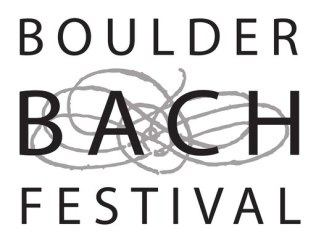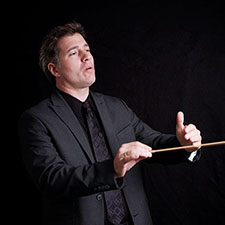B-minor Mass will be performed on Veterans’ Day/Remembrance Day Nov. 11
By Peter Alexander May 24 at 10:20 p.m.
The 38thconcert season of the Boulder Bach Festival, 2018–19, will include a performance of the B-minor mass, one of the great masterworks of European music, as well as a chamber concert, a guest appearance by conductor Nick Carthy from CU, a dance performance with electric instruments, and the unveiling of a new/old piano, manufactured in Paris in 1845.

Boulder Bach Festival Orchestra and Chorus, Zachary Carrettin, conductor
Also noteworthy will be the role of guest artists during the season, both as performers and as expert teachers of early musical performance styles, and the introduction of a Baroque orchestra and a Romantic orchestra as historically-informed performance ensembles.
The season was announced tonight (May 24) at the BBF’s final concert of the 2017–18 season. In a news release, the BBF’s director, Zachary Carrettin, commented: “The Boulder Bach Festival’s 38th season celebrates the influence of J.S. Bach across time and across cultures, and explores the musical dialogue with modern instruments, period instruments, electric instruments, and various vocal and choral forces. The guest artists contribute in performance, masterclasses, lectures, and more, adding to our rich cultural landscape.”

Robert Hill
The season opens Sept. 13 with a chamber concert featuring harpsichordist Robert Hill, who teaches historical keyboards and performance practice at the Hochschule für Musik in Freiburg, with Carrettin performing on Baroque violin and viola and the cello da spalla. The all-Bach program will include sonatas, a concerto, a suite, and the Chromatic Fantasy and Fugue in D Minor BWV 903. (See details of all concerts below.
The BBF returns to CU Macky Auditorium for a performance of the B-minor Mass on Nov. 11, Remembrance Day in the Commonwealth nations and Veterans’ Day in the U.S. The performance by the Bach Festival Orchestra, Chorus and soloists will be under Carrettin’s direction. Audience members will be given poppies, since World War I a symbol of soldiers lost in battle, and given the opportunity to place them on the front of the stage.

Nicholas Carthy
Nicholas Carthy, music director of the CU Eklund Opera Program, will be guest conductor for performances Feb 14 and 16 by the BBF Fellowship Artists Baroque Orchestra. Titled “From London with Love,” the concert will feature Baroque music from England.
The BBF moves to the Dairy Arts Center April 5, 6 and 7 when the Venice on Fire electric Baroque instrument trio collaborates with 3rdLaw Dance/Theater to recreate “Obstinate Pearly,” first performed in 2014. Composers will include Barbara Strozzi, J.S. Bach and their contemporaries.

1845 Érard piano
For the season finale May 23, the BBF will present a Romantic-era period instrument chamber orchestra accompanying pianist Mina Gajićin Chopin’s Piano Concerto #2 in F Minor. Past performances have introduced Gajić’s 1895Érard piano, and in this concert she will play her earlier Érard grand from 1845, an instrument built during Chopin’s lifetime. The orchestra will also perform Haydn’s Symphony No. 49 in F minor, “La Passione,” and the Fellowship Artists Vocal Ensemble will perform a motet by Brahms.
# # # # #
Boulder Bach Festival
38thSeason, 2018–19

Zachary Carrettin with cello da spalla
Gala opening concert
Robert Hill, harpsichord, and Zachary Carrettin, Baroque violin, viola and cello da spalla
Solo and duo works by J.S. Bach
7:30 p.m. Thursday, Sep. 13
Stewart Auditorium, Longmont Museum
Dance of Life: J.S. Bach’s B Minor Mass
Festival Chorus and Orchestra, Zachary Carrettin, conductor
With Jennifer Bird-Arvidsson, soprano; Abigail Nims, alto; Peter Scott Drackley, tenor; and Ashraf Sewailam, bass
2 p.m. Sunday, Nov. 11
Macky Auditorium
From London With Love
Songs of love and passionate concertos
Boulder Bach Festival Fellowship Artists Baroque Orchestra, Nicholas Carthy, guest conductor
With Guy Fishman, cello; Szilvia Schranz, soprano; and Claire McCahan, mezzo-soprano
7:30 p.m. Thursday, Feb. 14, 2019, Broomfield Auditorium
7:30 p.m. Saturday, Feb. 16, 2019, Stewart Auditorium, Longmont Museum

3rd Law Dance/Theater
Obstinate Pearl
Venice On Fire electric instrument trio with 3rd Law Dance/Theater
Zachary Carrettin, violin; Gal Faganel, cello; and Keith Barnhart, guitar
Katie Elliot, choreographer
Music by Barbara Strozzi, Robert de Visée, J.S. Bach and others
7:30 p.m. Friday, April 5, 2019
2 and 7:30 p.m. Saturday, April 6, 2019
7 p.m. Sunday, April 7, 2019
Dairy Arts Center

Mina Gajic
The Romantic Period Orchestra and Piano
Boulder Bach Festival Fellowship Artists Chamber Orchestra and Vocal Ensemble
Zachary Carrettin violin/conductor, with Mina Gajic, piano
Colorado debut of 1845 Érard grand piano
Brahms: Es ist das Heil uns kommen her
Haydn: Symphony No. 49 in F minor, “La Passione”
Chopin: Piano Concerto No. 2 in F Minor
7:30 p.m. Thursday, May 23
Boulder Adventist Church, 345 Mapleton Ave., Boulder
Season subscription tickets available May 25

























